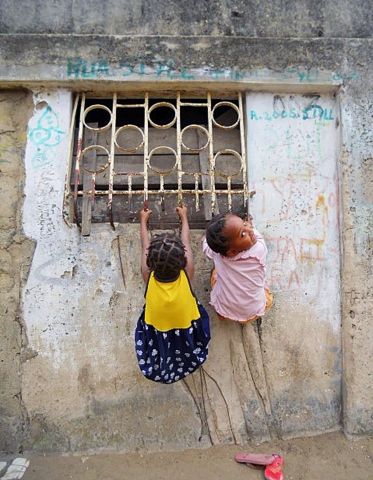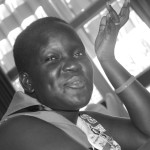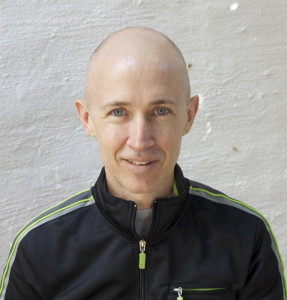“What happened?” asked her mom.
“Abana bagaba kusomelo nti nina silimu ate ntinda bika bubbi nyo era ngenda kuffa esawa yona era negamba nze silina kuba kusomero nina kubawaka effe bulungi,” said Rukiya.
“The children say I have [...]]]>

Climbing the wall of prejudice: HIV positive children need loads of love and support to deal with their own status and with prejudice. Credit: Mercedes Sayagues
One day Rukiya came home from school crying, sobbing that she didn’t want to go there again.
“What happened?” asked her mom.
“Abana bagaba kusomelo nti nina silimu ate ntinda bika bubbi nyo era ngenda kuffa esawa yona era negamba nze silina kuba kusomero nina kubawaka effe bulungi,” said Rukiya.
“The children say I have AIDS, I look very bad and I will be dying soon and I don’t need to be at school, I should stay at home and die.”
Rukiya is five years old and was born with HIV. Her mom didn’t know they were both HIV positive until Rukiya got very sick at age two. Both mother, father and daughter have been on antiretroviral therapy ever since. They live in Kampala, Uganda.
I’m like Rukiya’s second mom, so her alarmed mother called me. I was busy at work but realized that Rukiya needed me more than my office and went to their home.
Rukiya told me what happened and she asked me to tell her the truth, just me and her.
I didn’t know what to do. First I sat with the mother, just me and her. I asked if it was Ok for Rukiya to know the truth. The mother felt the child had the right to know, like any person living with HIV. We both thought she suspected or already knew what her daily pills were for.
So I told Rukiya she is HIV-positive like me and her mom. I explained that I have lived with HIV for ten years, double her age, and I am going to live for many more because I love myself the way I am.
“Mommy Jackie,” she said. “Wana ngeda kuffa mangu nyo oba nage neganda kubera nga gwe niyye eyonyi?”
“Is it true that I am going to die soon or will I live and be like you and travel like you?”
“You will live only if you love yourself, take good care of yourself and take your medicines without missing a day,” I replied.
“Is HIV the reason why I am taking these pills?” she asked.
“Yes,” we said.
Strong girl
I write this on one page but the process took us the whole day. Then it took two weeks of counselling, with loads of support, care and love we showed Rukiya, before she managed to go back to school without fear.
She looked happy and ready to start a new life with her known HIV status.
It gives me joy that she is such a strong girl who can handle a difficult situation.
Uganda has a policy that does not allow disclosing their HIV status to a child who is under 13 years old. For children with little or no support, this may be best. I would not disclose to children who don’t have the kind of strong family support Rukiya has.
But we decided to tell her because we felt she already knew the truth. We did not want her to hurt her further with a lie.
We started taking our medicines the three of us together, so she would feel she is not alone.
Recently I asked her what she wanted to do when she grew up.
“I want to be the first woman pilot in Uganda because when mummy Jackie tells me about her travels, it makes me feel like travelling everyday and every year,” she replied.
I smiled and hugged her. She is OK. We are OK. It was the right decision to tell her she lives with HIV.
Rukiya is now seven, healthy and doing well at school.
In my next blog I will tell you how it happened that I became Rukiya’s second mum.
 Jacquelyne Alesi is a wife, mother, daughter, HIV activist and Programme Director at the Uganda Network of Young People Living with HIV/AIDS, an organization that since 2003 works to improve the quality of life for HIV-positive youth in Uganda.
Jacquelyne Alesi is a wife, mother, daughter, HIV activist and Programme Director at the Uganda Network of Young People Living with HIV/AIDS, an organization that since 2003 works to improve the quality of life for HIV-positive youth in Uganda.
]]>
Subsequently, Jackline’s father [...]]]>
Subsequently, Jackline’s father refused to pay her university fees, arguing she was “a moving corpse”. And when Jackline disclosed to her boyfriend, he ended their relationship. Read her story here.
Is this an extreme experience, offset by stories of acceptance and openness?
Psychologist Marnie Vujovic and HIV practitioner Saranne Meyersfeld have worked with young people from urban and rural South Africa, who acquired HIV perinatally, and are now entering secondary school and adolescence.
They found that not only did these young people sometimes face stigma when they disclosed, but they also encountered ambivalence and mixed messages about their emerging sexuality.
Many parents wanted to withhold as much information about sex and sexuality as possible, fearing it would encourage early sex. Teachers, under-equipped to properly implement a life skills curriculum, or torn between more progressive ideas in the curriculum and the conservative beliefs they shared with their communities, were unable to help.
Against the backdrop of a push for HIV testing in South African schools, high levels of gender and sexual violence, moral panic and silence around teenage sexuality create hostile conditions for young people, who are ill prepared for an HIV positive test result and pressures to disclose.
In my work with HIV-positive university students, I have found that responses to disclosure pressures range from refusal to tell anyone to becoming an ambassador for openness and change.
Palesa´s journey to disclosure
One young woman, I will call her Palesa, grappled for months with telling her mother she was positive.
Infected with HIV by her first and only sexual partner, Palesa felt that she had let her mother down, that she would burden a single parent battling to hold the family together and that the pressures on her to graduate and support her family would increase.
HIV disclosure becomes important and necessary at different times – but it is almost always a hard thing to do. One thing is for sure, young people need our help and support to make safe and healthy disclosures.
I knew my work with Palesa had borne fruit when she introduced me to her new boyfriend. He is HIV-negative and a supportive and caring partner – proof that disclosure can come with a happy ending.
Pierre Brouard, director of the Centre for the Study of AIDS at the University of Pretoria, South Africa, is a clinical psychologist interested in sexualities, gender, human rights, and finding just the right word to grace a sentence, convey empathy or complete a crossword.
Though I don’t subscribe to Commentary, I read its “Contentions” blog daily. “Opinion”? Definitely. “American intellectual life”? Keep dreaming.
I certainly don’t respect any intellectuals who can’t realize that journalism requires some basic disclosures. This is [...]]]>
“COMMENTARY is America’s premier monthly magazine of opinion and a pivotal voice in American intellectual life.”
Though I don’t subscribe to Commentary, I read its “Contentions” blog daily. “Opinion”? Definitely. “American intellectual life”? Keep dreaming.
I certainly don’t respect any intellectuals who can’t realize that journalism requires some basic disclosures. This is not about a list of Commentary‘s top private donors (though I’d love to have a look). It’s a matter of simple journalistic ethics, which might be too much for the flagship neoconservative rag.
A publication cannot have a writer cover a letter from an advocacy organization to a U.S. government official by another contributor to the publication without somehow saying so. This is patently obvious. (I’ll floss here, and say that Ethics was the only class I got honors in at Columbia Journalism School.)
What’s more, not only did Alana Goodman cover the letter by Noah Pollak, on the letterhead of his Emergency Committee for Israel, she didn’t even name him. Pollak, who is the letter’s only signatory, wrote often for Commentary before last summer, when he launched ECI, a right-wing Israel lobby organization. Now he writes less frequently, but has contributed to “Contentions” as recently as Monday, 21 February.
The letter was to Dennis Ross, a senior White House adviser for the Middle East, expressing “surprise” that the official would be speaking at the upcoming conference of the liberal Israel lobby group J Street. Pollak asked Ross to use his speech to counter potential criticisms of Israel from other conference speakers.
As for attributing the letter in her post, Goodman wrote only:
The Emergency Committee for Israel has outlined some of the troublesome statements made by other conference speakers in a letter it sent to Ross today. …
The Emergency Committee for Israel has rightly asked Ross to “seize this moment to explain why the Jewish State is not just one of our closest allies, but a country that fully deserves the admiration and moral support of all Americans.”
Naturally, the post was picked up by the neoconservative Washington Post pundit Jennifer Rubin, who used to work with Pollak at Commentary. Rubin recently traveled on ECI’s dime to Israel and the Occupied Territories (where she made a swell case for the one-state solution). I wouldn’t put Rubin on the hook for having worked with Pollak, but this is where the one-time disclosure gets problematic. How much wining and dining was done on this trip anyway?
Rubin’s bit on the ECI letter, in her morning round-up, was simply this:
Awkward: Middle East adviser Dennis Ross is asked why he’s going to a J Street conference with so many anti-Israel characters.
Ross’s attendance is especially cringe-inducing in light of this: “Four Kadima MKs who accepted an invitation to speak at this weekend’s J Street conference in Washington faced criticism on Wednesday from colleagues in their faction who said they should not be supporting the left-wing American lobby.”
The “awkward” link goes to Alana Goodman’s Commentary post. Why? Surely Rubin has enough of a relationship with Pollak that he forwarded her the letter yesterday when it appeared online. He’s an advocate, and she has an opinion blog at a mainstream outlet, and they just took a long trip overseas together.
The “anti-Israel” comment is a label Rubin has a penchant for slapping on any even mild critic of the Jewish state, so I won’t bother with that. But why would the astute Jennifer Rubin think that it’s “cringe-inducing” that members of Kadima, a center-right Likud spin-off, would have a problem with a liberal lobby group? Isn’t that politics as usual?
Oh yeah, Rubin doesn’t think “liberal Zionism” exists, having declared the term an oxymoron. That’s the kind of rigid ideological neoconservatism I would expect from this triumvirate of Commentary zealots. I don’t know why I’m surprised that the journal has sunk to such low journalistic — let alone intellectual — standards.
]]>